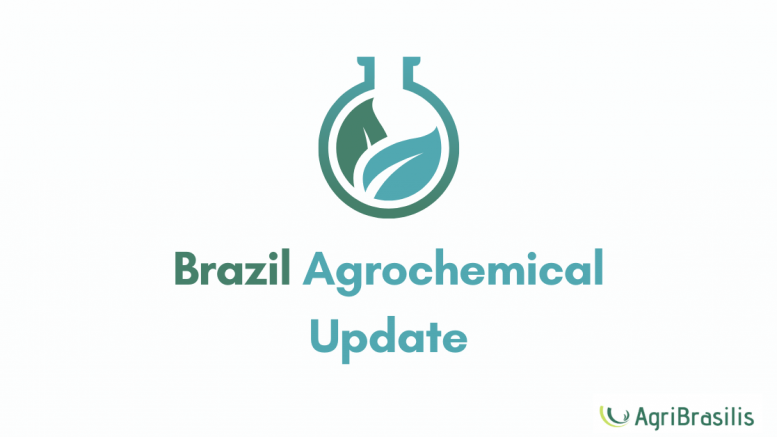Sales of special fertilizers grew by almost 65% in 2021, reaching US$ 3.2 billion
- Ibama publishes statement on the environmental reassessment of pesticides containing fipronil. Registration holders or applicants must submit to Ibama the documents and information provided in Annex II of Normative Instruction No. 17, of 05/01/2009. Fipronil-based products that already have the result of the Environmental Hazard Potential assessment, but whose registration has not been issued by the competent authority, will also be reassessed, subject to the same requirements. Proceedings are now suspended of evaluation requests for registration and alteration of registration referring to items I, II, III, V of § 4 of art. 22 of Decree No. 4074, of 01/04/2002 of formulated products containing fipronil already presented to IBAMA and those that may be filed. (Ibama)
- Seizure of 3,150 kg of emamectin benzoate in Mundo Novo, State of Mato Grosso do Sul. Cargo came from Foz do Iguaçu, State of Paraná. Packages were without manufacturer identification and with signs of fraud, such as formatting errors on the label and underlined words in Spanish. (Receita Federal)
- Organobom, company in State of Espírito Santo that produces fertilizers from organic waste, plans to produce it using food scraps in the rumen of slaughtered cattle. According to Evandro Moreira, director of Organobom: “What would be buried before, can now be reused and sold as something of great value.” (Organobom)
- On the eve of planting the 2022/23 soybean crop, farmers from the State of Mato Grosso are still waiting for the delivery of fertilizers. In the city of Lucas do Rio Verde, only 65% of the fertilizer purchased for the new cycle was delivered. (Rural Union of Lucas do Rio Verde)
- Difficulty in delivering fertilizers will be accompanied by higher freight costs, because of the concentration of orders, according to Marcos Stelzer, CEO of Galvani. Also according to Stelzer, high prices and loss in the exchange ratio between commodities and fertilizers will cause a retraction in fertilizer deliveries to 42 million tonnes in 2022, down from 46 million in 2021. Next year, the executive estimates that sales will reach 46 million tonnes. (Galvani)
- Pedro Parenti is Yara’s new senior vice president for Latin America. (Yara)
- Basf launches an online platform with financial solutions, services and a virtual store for retailers of agricultural inputs and farmers. Conecta.ag platform was created in partnership with Vertem, which provides IT consultancy for companies, and aims to involve at least 50 distribution networks. (Basf)
- Evonik announces Hendrik Schoenfelder as new CEO for South and Central America. (Evonik)
- 440 L of paraquat were seized on BR-280, in Canoinhas, State of Santa Catarina. In Rio Verde, State of Goiás, businessmen and farmers suspected of selling counterfeit pesticides were arrested by the Civil Police, who reported losses of up to 80% in the yields of soybean and corn farms in the region, reaching US$ 2.85 million. (Federal Highway Police; Civil Police of Goiás)
- Sales of special fertilizers grew by almost 65% in 2021, reaching US$ 3.2 billion. Organic fertilizers had the biggest increase in sales, up 130.8%, followed by organominerals (68.3%) and special minerals (57.9%). (Abisolo)
- Helm do Brasil receives the Great Place to Work seal, one of the most respected certifications in people management. (Helm)
- Cibra announces that CibraCoin, its cryptocurrency backed by kg of phosphate fertilizer, potassium chloride and urea, has passed the testing phase. Volume handled in six months was small in relation to total sales, but farmers are expected to adopt more financial hedge mechanisms. The company also intends to build a factory in São Luís do Maranhão, State of Maranhão, less than 10 km from the Port of Itaqui. (Cibra Fertilizers)
- Between August 2021 and 2022, Brazil purchased 191.8% more fertilizers than in the same period of the previous year. Biggest supplier was Canada, with 39% of the total, followed by Russia, with 33% and China with 14%. Total was US$ 21 billion in imports. (Ministry of Economy)
- Draft Legislative Decree PDL 312/22 authorizes the use of carbendazim fungicide, seeking to annul Anvisa Resolution 739/22, which decided to gradually reduce the use of carbendazim in agriculture. Deputy José Mario Schreiner is the author of the Project, and says he considers the sudden suspension a problem for the entire agricultural chain. (Chamber of Deputies)
- Fertilizer purchasing power improves in August. Increase is estimated at 19% compared to July. Improvement happened because of the decrease in domestic demand for phosphates and the normalization of fertilizer imports from Russia. (StoneX Consulting; Mosaic Fertilizantes)
- Emater, Cotrifred and the Secretary of Agriculture and Environment of Palmitinho, State of Rio Grande do Sul, promote a Course on Good Agricultural Practices for the Application of Pesticides focused on the rules for trade and use of hormonal herbicides to avoid damage caused by drift. (Emater-RS)
- Bayer opens a trainee program only for black people, with 33 openings for the States of São Paulo, Minas Gerais and Rio de Janeiro. (Bayer)
- Amanda Leitão is promoted to Licensing Technical Manager for Latin America at Syngenta. (Syngenta)
- Mosaic enters the organic market inputs. The phosphogypsum was certified by IBD, the biggest Latin America organic certifier. (Mosaic)
READ MORE:

